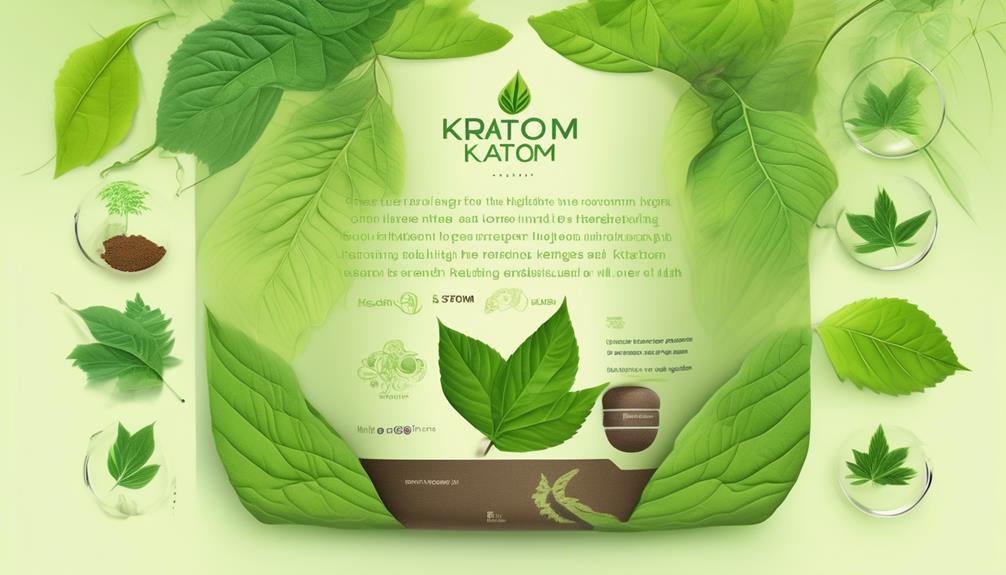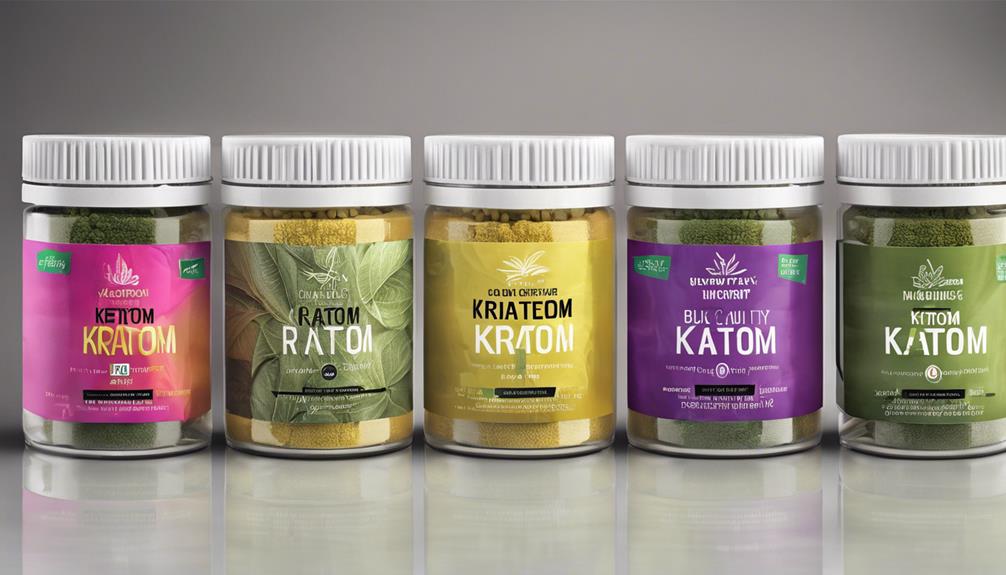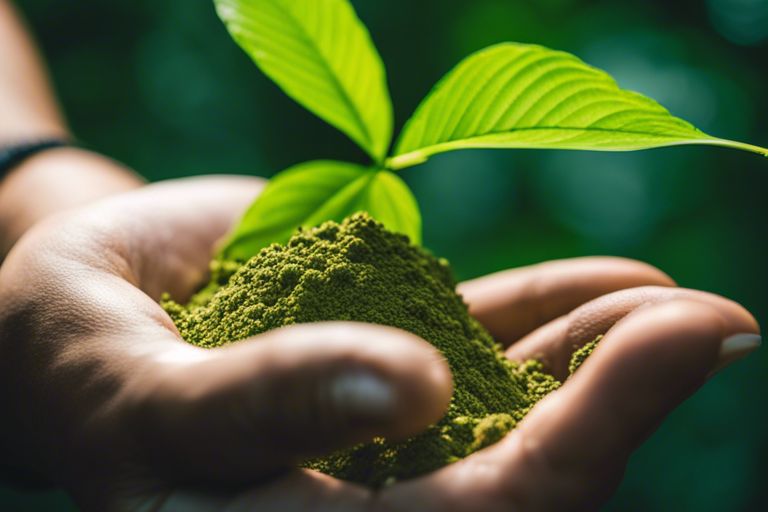Have you ever wondered if the herbal supplement kratom could potentially harm your liver? Well, hold onto your hat because we're about to dive into this topic and uncover the truth. While it may seem like a harmless natural remedy, there have been concerns raised about the impact of kratom on liver health. But before we jump to any conclusions, let's explore the evidence and examine the symptoms and complications associated with kratom use. So, if you're curious to know whether kratom can hurt your liver, buckle up and get ready for a revealing discussion that may just leave you with more questions than answers.
Potential Liver Damage From Kratom
Kratom has been associated with the potential for liver damage, including acute injury and, in rare cases, acute liver failure. This herbal supplement, derived from the leaves of a tropical evergreen tree found in Southeast Asia, has gained popularity in the United States, particularly among individuals seeking relief from chronic pain or opioid withdrawal. However, it is important to be aware of the potential side effects and risks associated with its use.
Several studies and reports have highlighted the potential for kratom to cause liver injury. Animal studies have shown adverse effects and toxicities to the liver, kidney, and lungs when exposed to high doses of kratom. In humans, the US Food and Drug Administration (FDA) has reported about 30 deaths associated with kratom between 2009 and 2016, with liver injury being one of the contributing factors in some cases.
The exact mechanism by which kratom causes liver damage is not fully understood. However, it is believed that certain compounds in kratom may have a direct toxic effect on liver cells. Additionally, the potential for liver injury may be heightened when kratom is used in combination with other substances, such as alcohol or medications that are known to be hepatotoxic.
It is worth noting that while liver damage from kratom is a concern, it appears to be relatively rare. Most individuals who use kratom do not experience any liver-related problems. However, it is crucial to be aware of the potential risks and to use kratom responsibly. If you are considering using kratom for its purported benefits, it is advisable to consult with a healthcare professional who can provide guidance and monitor your liver function regularly.
Research on Kratom and Liver Health
Although the exact mechanism by which kratom causes liver damage is not fully understood, research has revealed cases of kratom-related liver injury resulting in jaundice. Kratom has been linked to liver damage and even deaths, with over 1,800 calls to US poison centers reported from 2011-2017 due to kratom ingestion. The plant from which kratom is derived contains more than 40 psychoactive alkaloids, and some of these alkaloids have been shown to bind and activate opioid receptors, potentially impacting liver health.
Studies have shown that kratom supplementation has been implicated in acute liver injury, organ dysfunction, toxicity, coma, seizures, and even death. Research has also found that the risk of liver injury increases with higher doses and prolonged use of kratom. In severe cases, liver transplant may be necessary to save the individual's life.
The FDA has performed extensive biochemical analysis of kratom, and their findings support the need for increased regulation of this substance to address the risks associated with its use. The agency has identified several cases of drug-induced liver injury associated with kratom consumption.
While more research is needed to fully understand the relationship between kratom and liver health, the existing evidence suggests a potential for kratom abuse to harm the liver. Therefore, it is crucial to be aware of the potential risks of kratom addiction and to seek medical attention if any symptoms of liver damage, such as jaundice or abdominal pain, occur after kratom use. It is always important to consult with a healthcare professional before starting any new supplement or herbal remedy to ensure the safety of your liver and overall health.
Symptoms of Liver Damage Caused by Kratom

One of the prevalent symptoms of liver damage caused by kratom is jaundice, which is indicated by yellowish skin and eyes. This occurs when the liver is unable to properly process bilirubin, a yellow pigment produced during the breakdown of red blood cells. Dark urine and pale stool color are also common symptoms associated with liver damage from kratom. Additionally, fatigue, nausea, and vomiting may occur as a result of liver injury.
Liver damage caused by kratom can result in other symptoms as well. Itchy skin, known as pruritus, is a common manifestation of liver disease. Swelling of the legs, ankles, and feet, known as edema, may also occur due to fluid retention caused by compromised liver function. These symptoms can significantly impact a person's quality of life and may require medical intervention.
It is important to note that liver damage caused by kratom can lead to serious complications. Severe infections, bleeding, and increased brain pressure are potential consequences of acute liver injury. Prolonged use of kratom, even in normal doses, can cause liver injury and toxicity. This is likely due to the presence of kratom alkaloids, which can have detrimental effects on liver cells.
Research has shown that kratom has the potential to cause liver damage. Studies have found that kratom use can lead to elevated levels of liver enzymes, indicating liver injury. Additionally, kratom use has been associated with changes in the levels of amino acids in the liver, further suggesting potential harm to the organ.
Complications Associated With Kratom Use and Liver Health
Complications associated with the use of kratom and its impact on liver health have been extensively documented and raise significant concerns. Kratom, a botanical native to Southeast Asia, has been linked to cases of acute liver injury and, in rare instances, acute liver failure. The use of kratom has also been associated with an increase in calls to poison centers and reports of adverse effects, including liver damage and failure. The Drug and Alcohol Centers for Disease Control and Prevention (CDC) has reported cases of kratom-induced adverse effects, while the Food and Drug Administration (FDA) has identified deaths associated with kratom use.
Kratom alkaloids, the active compounds in this herbal supplement, have been shown to have opioid and euphoric effects. However, their use has also been associated with liver damage and serious complications. The potential risks of using kratom, including liver injury, toxicity, and even death, highlight the need for caution and thorough consideration before using this substance.
The Drug Enforcement Administration (DEA) has raised concerns about the abuse potential of kratom, classifying it as a "Drug of Concern." Given the documented cases of liver damage and other adverse effects, it is crucial for individuals to be aware of the potential risks associated with kratom use. Monitoring liver function is essential for those who choose to use kratom, as it can help identify any signs of liver injury early on. It is important to prioritize overall health and well-being and to seek medical attention if any concerning symptoms arise.
Are Liver Issues Common in People Addicted to Kratom?
Liver issues can be common in people addicted to kratom. Some kratom addiction signs symptoms may include jaundice, dark urine, and abdominal pain – all potential indicators of liver damage. It’s important for individuals struggling with kratom addiction to seek medical help and be aware of these warning signs.
Tips for Using Kratom Safely and Promoting Liver Health

To ensure the safe use of kratom and promote liver health, it is important to follow these tips. While kratom has been associated with liver injury in some cases, it is crucial to note that the majority of users do not experience any liver damage. By practicing responsible and informed use, you can minimize the potential risks and promote a healthy liver.
Firstly, it is essential to purchase kratom products from reputable sources. Make sure to buy from trusted vendors who provide high-quality and properly labeled products. This ensures that you are consuming kratom that is free from contaminants and adulterants, which can potentially cause liver injury.
Secondly, it is important to use kratom in moderation. Avoid excessive and prolonged use, as this may increase the risk of liver damage. Set limits on your kratom consumption and adhere to them. It is also advisable to take regular breaks from kratom use to give your liver a chance to recover and function optimally.
Additionally, it is crucial to stay hydrated while using kratom. Drinking plenty of water throughout the day helps to support liver function and flush out toxins from your body. Proper hydration can also help prevent dehydration, which may strain the liver and potentially lead to liver injury.
Lastly, consider incorporating liver-healthy habits into your lifestyle. Eating a balanced diet rich in fruits, vegetables, and whole grains can provide essential nutrients and antioxidants that support liver health. Regular exercise and maintaining a healthy weight can also help promote optimal liver function.
Can Kratom Use Lead to Liver Damage?
There is growing concern about kratom heart risks and its potential impact on liver health. While research is ongoing, some studies have linked kratom use to liver damage. It’s essential for anyone considering using kratom to be aware of the potential risks and to speak with a healthcare professional before using it.
Frequently Asked Questions
What Drug Is Most Toxic to Liver?
The most dangerous drug when it comes to liver toxicity is acetaminophen. Drug-induced hepatitis and liver damage are commonly associated with its use. Acetaminophen overdose can lead to hepatotoxicity, causing liver injury and potentially even liver failure. In severe cases, liver disease may progress to the point where a liver transplant is necessary for survival. Therefore, it is important to use acetaminophen responsibly and follow the recommended dosage to protect your liver function.
What Does Liver Pain Feel Like?
Liver pain can be described as a dull ache or sharp stabbing sensation in the upper right abdomen. It may radiate to the back or shoulder and can be accompanied by tenderness. Some people feel a sense of fullness or discomfort under the ribs. Liver pain can be associated with symptoms like jaundice, nausea, vomiting, and unexplained weight loss. In severe cases, it can cause extreme tightness or pressure in the upper abdomen. It's important to understand the causes, symptoms, and remedies for liver pain.
What Supplements Are Toxic to the Liver?
Dietary supplements: are they really necessary? The role of antioxidants in liver health. Herbal remedies: are they safe for your liver? Alcohol and liver damage: the harsh reality. Hepatitis C and its impact on liver function. Non-alcoholic fatty liver disease: causes and prevention. Medications that can harm your liver: a comprehensive guide. The impact of environmental toxins on liver health. Liver detoxification: fact or fiction? Nutritional strategies for promoting liver health.
Can the Liver Heal Itself?
Yes, the liver can heal itself through a process called regeneration. The time it takes for the liver to heal can vary depending on the extent of damage and individual factors. Factors that can impair liver healing include excessive alcohol consumption, certain medications, and a poor diet. Natural remedies for liver health include staying hydrated, maintaining a healthy diet, and regular exercise. It's important to seek medical advice and make lifestyle changes to support liver regeneration.










